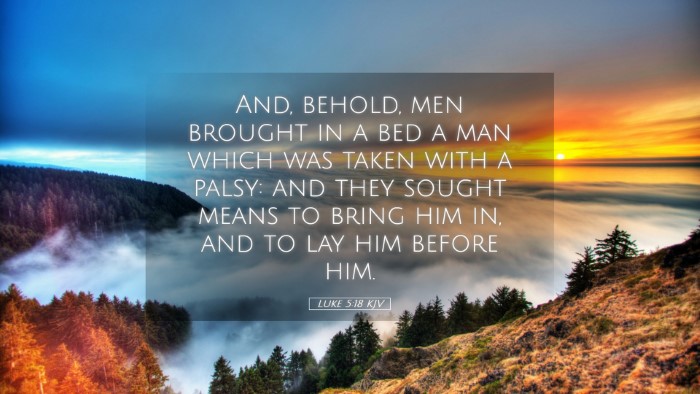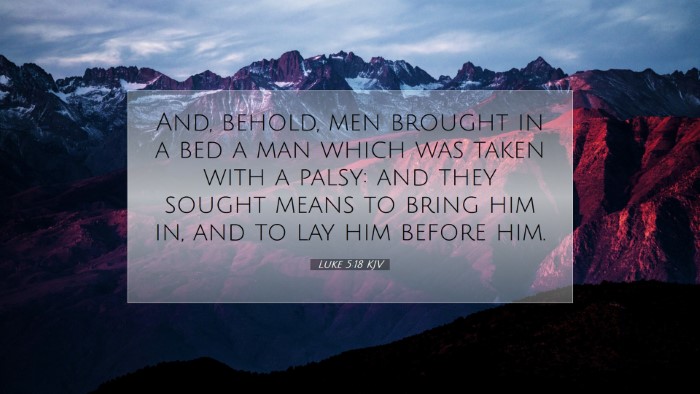Commentary on Luke 5:18
Luke 5:18 states: "And they brought a man which was taken with a palsy; and they sought means to bring him in, and to lay him before him." This verse introduces an event marked by themes of faith, determination, and the power of Christ to heal. The significance of this healing miracle is profound and rich with theological insight.
Context and Background
The Gospel of Luke emphasizes the compassion of Jesus and His authority to heal and forgive sins. In the surrounding passages, we see a growing crowd attracted to Jesus’ teachings and miraculous works. It is within this context that the paralytic is brought forth—a testament to both the man's plight and the response of his friends.
Insights from Public Domain Commentaries
Matthew Henry's Commentary
Matthew Henry highlights the urgency and determination of the friends who brought the paralytic. He suggests that true love and faith often involve diligent efforts to bring those in need to Christ. Henry notes:
- Determined Faith: "These friends showed great compassion; they did not let the crowd deter them."
- Meaning of the Palsy: The palsy symbolizes not just physical ailments but also the spiritual paralysis many face without Christ.
- Collective Action: The act of bringing the man to Jesus emphasizes the importance of community in spiritual healing.
Albert Barnes' Notes on the Bible
Albert Barnes offers a deeper exploration into the significance of "bringing" someone to Christ. He articulates that:
- Symbol of Intercession: "These men acted as intercessors, highlighting the need for us to advocate for others before Christ."
- Jesus' Compassion: The action taken by these friends reveals the nature of Christ, who welcomes those burdened by sin and suffering.
- Faith in Action: The physical act of carrying the paralytic can be seen as a metaphor for how faith is manifested through action.
Adam Clarke's Commentary
Adam Clarke reflects on the healing power of faith, explaining that:
- Faith's Role: "Their belief that Jesus could heal their friend prompted them to seek Him out, an essential aspect of prayer and petition for one another."
- Obstacles Overcome: Clarke emphasizes that the obstacles—the crowd and the physical limitations—were no match for their faith, a pivotal lesson for adherents.
- Holistic Healing: "Jesus' ministry is not just about physical healing. It encompasses spiritual restoration, indicating the holistic nature of His work as Savior."
Thematic Reflections
From these commentaries, several themes emerge that are relevant for pastors, students, and theologians:
- Faith in Community: The act of the friends brings to light the crucial role of community in healing and support. Church leaders should encourage collective faith activities, promoting intercessory prayer and group outreach efforts.
- Persistence in Faith: The friends' refusal to be deterred by the crowd illustrates the necessity of perseverance. In ministry, this serves as a reminder that challenges in outreach should not weaken resolve but strengthen it.
- Bringing Others to Christ: The focus on bringing others to Christ emphasizes evangelistic efforts, calling believers to engage actively in introducing others to the hope found in Jesus.
Conclusion
Luke 5:18 serves as a powerful narrative illustrating the intersection of faith, community, and the healing power of Christ. The insights from Matthew Henry, Albert Barnes, and Adam Clarke collectively urge the reader to reflect on their faith in action, prioritize intercession, and recognize the importance of community support in the journey of faith. As one contemplates this passage, let it inspire renewed efforts to bring both physical and spiritual healing to those in need, embodying the love and grace that Christ offers to all.


